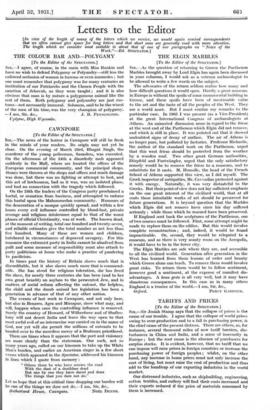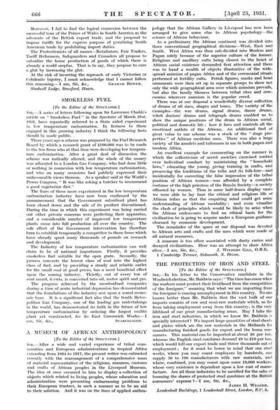TARIFFS AND PRICES
[To the Editor of the SPECTATOR.] SIR,—Sir Josiah Stamp says that the collapse of prices is the cause of our trouble. I agree that the collapse of world prices owing to over-production and to a fall in purchasing power, is the chief cause of the present distress. There are others, as, for instance, several thousand miles of new tariff barriers, dis- turbances in China and India, and a sense of insecurity in Europe ; but the root cause is the absence of purchasers for surplus stocks. It is evident, however, that no tariff that we can impose will raise prices in foreign countries or increase the purchasing power of foreign peoples ; whilst, on the other hand, any increase in home prices must not only increase the cost of living, but must raise the cost of production and thus add to the handicap of our exporting industries in the world market.
Our distressed industries, such as shipbuilding, engineering, cotton textiles, and cutlery will find their costs increased and their exports reduced if the price of materials consumed by them is increased. Moreover, I fail to find the logical connexion between the successful tour of the Prince of Wales in South America as the advocate of the British export trade, and the proposal to impose tariffs for the express purpose of penalizing South American trade by prohibiting import duties.
The Protectionists of all names—Retaliators, Fair Traders, Tariff Reformers, Safeguarders and Crusaders all propose to subsidize the home production of goods of which there is already a world surplus. That is to say, they propose to cure a glut by increasing the glut.
At the risk of incurring the reproach of early Victorian or Cobdenite bigotry, I must acknowledge that I cannot follow
this reasoning.—I am, Sir, &e., GRAHAM BOWER. Studwell Lodge, Droxford, Hants.







































 Previous page
Previous page